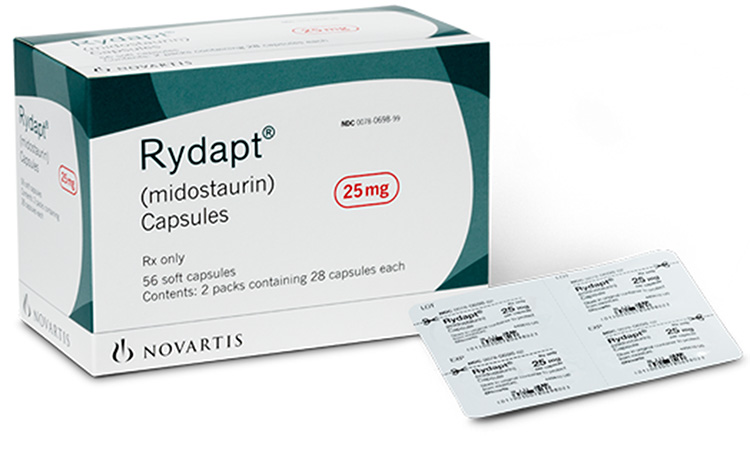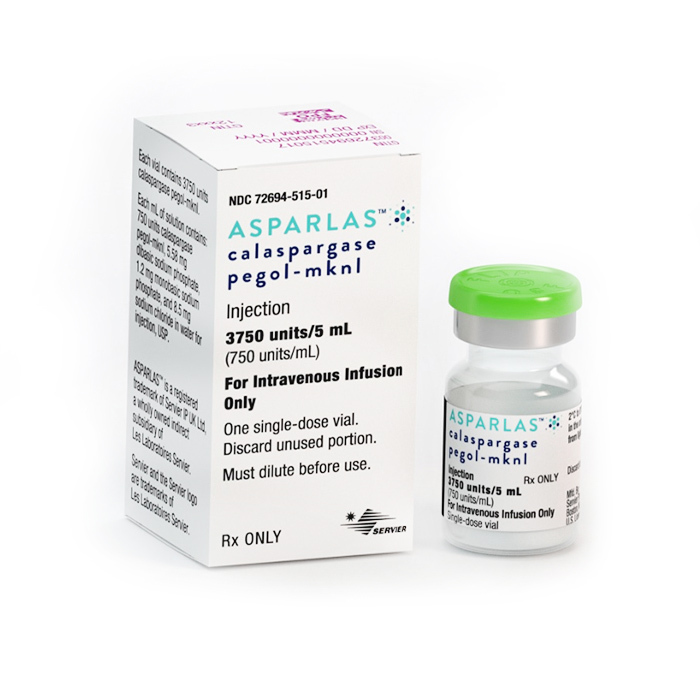Rydapt (midostaurin) vs Asparlas (calaspargase pegol-mknl)
Rydapt (midostaurin) vs Asparlas (calaspargase pegol-mknl)
Rydapt (midostaurin) is a kinase inhibitor used for the treatment of acute myeloid leukemia (AML) with a specific genetic mutation and is often given in combination with chemotherapy. Asparlas (calaspargase pegol-mknl), on the other hand, is a modified enzyme used as part of a multi-agent chemotherapeutic regimen for the treatment of acute lymphoblastic leukemia (ALL). The choice between these two medications would depend on the type of leukemia a patient has, as Rydapt is specific to certain AML cases, whereas Asparlas is tailored for ALL treatment.
Difference between Rydapt and Asparlas
| Metric | Rydapt (midostaurin) | Asparlas (calaspargase pegol-mknl) |
|---|---|---|
| Generic name | Midostaurin | Calaspargase pegol-mknl |
| Indications | Acute Myeloid Leukemia (AML), Systemic Mastocytosis | Acute Lymphoblastic Leukemia (ALL) |
| Mechanism of action | Protein kinase inhibitor | Modified enzyme that breaks down asparagine |
| Brand names | Rydapt | Asparlas |
| Administrative route | Oral | Intravenous |
| Side effects | Febrile neutropenia, nausea, mucositis, vomiting, headache | Hypersensitivity reactions, elevated liver enzymes, pancreatitis, thrombosis |
| Contraindications | Hypersensitivity to midostaurin or excipients | Hypersensitivity to calaspargase pegol, pegaspargase, or excipients |
| Drug class | Kinase inhibitor | Enzyme replacement |
| Manufacturer | Novartis Pharmaceuticals | Servier Pharmaceuticals |
Efficacy
Efficacy of Rydapt (midostaurin) in Leukemia
Rydapt, known generically as midostaurin, is a targeted therapy approved for the treatment of adult patients with newly diagnosed acute myeloid leukemia (AML) that is FLT3 mutation-positive, as detected by an FDA-approved test. It is used in combination with standard cytarabine and daunorubicin induction and cytarabine consolidation chemotherapy. The efficacy of Rydapt in this setting was demonstrated in a pivotal phase III clinical trial (the RATIFY trial), which showed a significant improvement in overall survival when Rydapt was added to standard chemotherapy, compared to chemotherapy alone. Patients who received Rydapt had a median overall survival of 74.7 months, compared to 25.6 months for those who received placebo.
Furthermore, Rydapt has also shown efficacy in the treatment of adults with aggressive systemic mastocytosis (ASM), systemic mastocytosis with associated hematological neoplasm (SM-AHN), or mast cell leukemia (MCL). These are rare forms of leukemia that are associated with the presence of the KIT D816V mutation. Clinical trials have demonstrated that Rydapt can lead to reductions in mast cell burden and improvements in symptoms and quality of life for patients with these conditions.
Efficacy of Asparlas (calaspargase pegol-mknl) in Leukemia
Asparlas, or calaspargase pegol-mknl, is a novel formulation of the enzyme asparaginase, which is used as part of a multi-agent chemotherapeutic regimen for the treatment of acute lymphoblastic leukemia (ALL). Asparlas has been specifically designed to provide a longer circulating half-life than native asparaginase, allowing for less frequent dosing. The efficacy of Asparlas was established based on the demonstration of achievement and maintenance of nadir serum asparaginase activity (NSAA) above the level of 0.1 U/mL, a threshold believed to be necessary for activity against ALL cells. Clinical trials have shown that Asparlas is effective in maintaining this therapeutic threshold with a dosing schedule of once every three weeks.
In a clinical study that supported the approval of Asparlas, patients with ALL received either Asparlas or native E. coli asparaginase as part of a multi-agent chemotherapeutic regimen. The study met its primary endpoint of demonstrating that a high proportion of patients treated with Asparlas maintained the therapeutic level of asparaginase activity. This efficacy, combined with the extended dosing interval, offers a beneficial treatment option for patients with ALL, potentially reducing the treatment burden and improving patient compliance.
Regulatory Agency Approvals
Rydapt
-
European Medical Agency (EMA), European Union

-
Food and Drug Administration (FDA), USA

-
Health Canada

-
Therapeutic Goods Administration (TGA), Australia

-
Medsafe (NZ)

Asparlas
-
Food and Drug Administration (FDA), USA

Access Rydapt or Asparlas today
If Rydapt or Asparlas are not approved or available in your country (e.g. due to supply issues), you can access them via Everyone.org.
How it works

Make an enquiry
Choose the medicine you want to buy, answer a couple of questions, and upload your prescription to speed things up. We’ll get back to you within 24 hours.


Make an enquiry
Choose the medicine you want to buy, answer a couple of questions, and upload your prescription to speed things up. We’ll get back to you within 24 hours.


Breeze through the paperwork
We'll guide you through the required documents for importing unapproved medicine, ensuring you have all the necessary information.


Get a personalized quote
We’ll prepare a quote for you, including medicine costs and any shipping, administrative, or import fees that may apply.


Receive your medicine
Accept the quote and we’ll handle the rest - sourcing and safely delivering your medicine.

Some text on this page has been automatically generated. Speak to your physician before you start a new treatment or medication.
Let's talk
If you have any questions, call us or send us a message through WhatsApp or email:
Contact us




